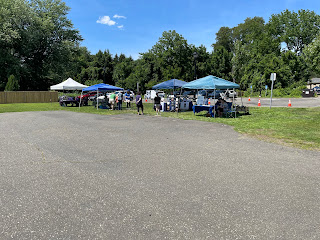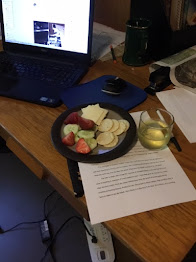Truthfully, it's been a couple of weekends now.
The Struggle To Sell
Events like the book walk organized by Nutmeg Lit Fest last month are all about bringing readers and books together. Which sounds very nice. What they're really about is money, which doesn't sound as nice. We are talking about marketing books. Whether you are a self-published or traditionally published author, marketing is difficult. In large part this is due to the 2 million books that are published each year,
which I mentioned last time. There are nowhere near enough readers to read all those books. In fact, as I also mentioned, eighty percent of those books will sell fewer than 100 copies.
Given those facts, being able to sell more than 100 copies of a book becomes a major achievement. But what about some other figures?
A Traditionally Published Author
 |
| Hal Johnson sketching in my book |
I met
Hal Johnson, the author of
Impossible Histories, published by a Macmillan imprint, at the book walk. He was one of two traditionally published authors I talked to, though there may have been more there. In our conversation, Johnson said that he took part in events like this one because traditional publishers don't do much marketing anymore. This is something I hear a lot to the point that I'd almost call it common knowledge now. But I don't really know what it means, because it's been so long since I've had a book published, myself.
Back in my day, boys and girls, marketing from traditional publishers involved:
- Sending arcs of your books to professional review sites
- Including your books in their seasonal catalogs
- Maybe taking your book to teacher and library conferences
- If your book received a certain number of starred reviews, you'd get an advertisement in a professional publication of some sort
- The Hero of Ticonderoga was included in a one of those box displays in bookstores, but I can't remember why.
Are traditional publishers doing less of the above now? Or does the above have less impact because of the overwhelming number of books out there?
It doesn't matter, of course. The end result is the same. It's hard to sell traditionally published books.
My husband and I used to think that handselling like we saw at the book walk didn't matter, because the number of books you'd sell would be so small, it couldn't have an impact. But, remember, eighty percent of books published sell fewer than 100 copies. You want to sell more than 100 copies to get into the twenty percent! That seems doable by making the effort to handsell at events like this. Remember, someone told me at this book walk that s/he had sold 200 copies of a book in a few months.
But what about the income involved, Gail? For a number of years, conventional wisdom claimed that most traditionally published books don't sell enough copies to earn back the author's advance, the advance being an advance against sales that traditional publishers pay authors upfront when they agree to publish a book. Recently (meaning just now) I've read that that isn't necessarily true. At any rate, the advance isn't the only money traditional publishers invest in books. They have to pay for:
- all editing,
- layout and design,
- interior artwork, if there is any,
- cover illustrations,
- design of the covers,
- and all the marketing listed above.
Will selling more than 100 books cover all that, making you look like a desirable risk your publisher might publish again? How many books do you have to sell to do that? Beats me.
The Self-Published Authors
 |
| Mike Jakubowski |
Mike Jakubowski, author of
The Kings of Beacon and Joey and the Ocean of Possiblities, was one of
the first authors I spoke to. I was drawn to his covers and learned that he had a friend who did the illustrations and another friend who did the design work for them. We agreed this was very significant, because the cost of self-publishing can get up there.
In fact, that's why I always call self-published writers self-published and not independent. They have to bear the burden of finding people to do all the work described above that traditional publishers do for the books they publish, and they have to pay for it. Themselves. There are companies that will do that for writers, and I've seen costs for that going anywhere from $5,000 to $10,000. The companies I've read about didn't include a developmental editor, which is the most important and possibly the most expensive part of publishing.
But what about the income involved, Gail? You often see not having to share income with a publisher as being one of the benefits of self-publishing. But without a publisher, you don't have anyone to take on the financial risk of publishing. Authors have to pay for everything. Themselves.
How many books do they have to sell to cover their expenses? Again, it beats me.
Gail Is Impressed
Yes, when I go to any of these book events, I am greatly impressed by the effort and ingenuity and expense the authors attending put into their marketing materials.
I'm talking serious posters, for instance, such as the one that
Greg Gilmartin had made of his book covers. In fact, glossy book cover posters are a very common thing. I still have a poster a book fair made of one of my covers, but it was some kind of digital printout glued to a poster board. In two decades things have improved.
I saw table coverings like the one Hal Johnson had made printed with his book covers.
I try not to pick up bling at festivals, because I dabble in minimalism and environmentalism. So I don't have much of that to show. But we're not talking the Kinko's black and white bookmarks I handed out in schools back in the day or the business cards we made on our printer. We're talking about beautiful things. Lots of them printed on both sides!
Don't I sound as if I just came out of the hills?
What really freaks me out, though, are the canopies.
These writers often market outdoors, and in addition to lugging a fold-up table of some sort and a chair, they also have to carry canopies with them to protect them from the sun and, presumably, some light rain.
As does Kelly Jarvis.
 |
| One of 4 book walk stations. |
As did most of the authors at the Wethersfield Book Walk.
Now, I have a canopy on my deck. It's horrible to work with. The one we have now is only a year old, and we've already punched a hole in it. Dealing with canopies is not a minor task. These writers are putting in a lot of personal, physical work to market their books.
I'm going to be honest. I don't want to say I'm too lazy to do this kind of thing, but I'm too lazy to do this kind of thing. I have cases of my out-of-print books and thought about trying to join an upcoming event just to sell off what I've got. But then I said, No. No, no, no.




























